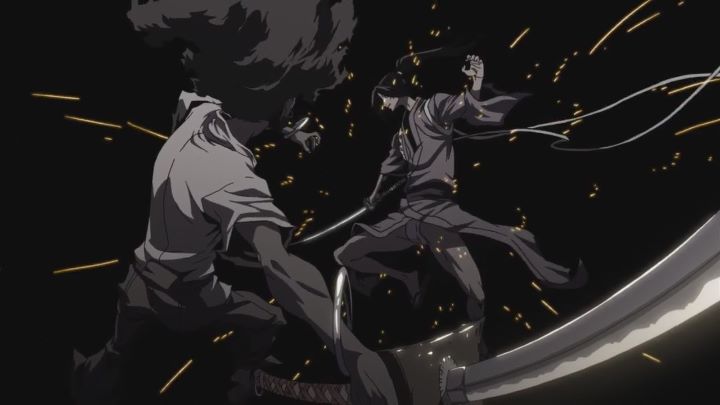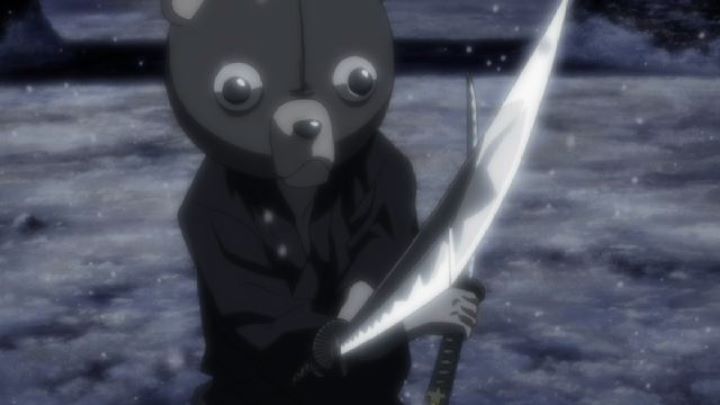








Around 2007, "Afro Samurai" was something of a phenomenon for anime fans in America. Originally based on a 1999 independent manga, it was used as the basis for a media franchise, centering around the short five-episode anime, but also spawning a video game, soundtracks, a feature film sequel, and other promotional fare. Each element deserves an essay to talk about it: the video game in particular was generally considered a standardly-poor action platformer cash-in, but the passion of the developers came through in its advances in high-quality cel-shading, and in the ability to slice enemies at virtually any limb and any direction, a feature that would be called revolutionary in "Metal Gear Rising - Revengeance," a game released a full four years AFTER "Afto Samurai" 's game tie-in. The influence on culture still remains, albiet in smoldering pieces: a sequel to the game was partially released in 2015 before being canceled, and a rumored live-action adaptation was presumed canceled years after the anime.Regarding the anime, it itself is a abnormality. This is because it was produced and released primarily for Spike TV in North America. This means that originally, and to this day, there is no Japanese dub for the series, only an English track exists. It isn't unusual for an anime to be produced with American audiences in mind, and sometimes with American producers and directors, but to be exclusively meant for English audiences is something I haven't seen since, despite the show still being directed and animated in Japan by Studio Gonzo. Speaking of the voice track, it features none other than Samuel L. Jackson as the lead (this would be the first but not last significant reminder that he is a proud fan of anime, and he even had a role in the creative process behind this production), and Ron Perlman as the raspy villian. The rest of the cast is rounded out primarily by voice-acting regulars, but to see actors at the time near the height of their careers in live-action being involved would make any fan geek out, especially since both are so entwined in geek culture in general.The story of "Afro Samurai" is a straightforward tale of revenge and violence. The world is a harsh alternate reality, resembling feudal Japan but with the use of some modern and advanced technology in places. The general law of the world is that of the headbands: the bearer of the Number 1 Headband is said to have God-like status. The exact ability the headband provides is never really clear, as far as we can tell it is simply a piece of cloth that can be used to acquire respect, but not with any power or wealth behind it. As a sign of status, it is highly coveted, and a fighter may challenge the owner of the Number 1, but to have this right, they must first be the bearer of the Number 2 headband. This makes the Number 2 also highly valuable, the difference being that ANYONE can challenge the Number 2, making it a bit more dangerous to own.In the opening scenes of episode 1, we get a disturbingly violent passage (one that legitimately shook me when I first watched it as a young teenager) that introduces the way of the world. An older samurai in a dusty mountain side, the owner of the Number 1, is challenged by the ironically-named Justice, a skeleton-skinny gun-toting grey man with a toothy grin, looking as if he stepped out of a Western. The samurai's son, perhaps five years old at the time, watches as his father is brutally killed, his head cleanly lopped off, Justice pulling the headband off his afro hair and kicking the head to the boy's feet. Horrified and full of grief, he looks at his father's disconnected head as it mouths the words "avenge me." Justice walks away with the headband, but not before reminding the grieving child named Afro that he, too, can challenge him one day for the headband. And so, Afro grows into a cold-hearted killer, preparing himself to kill Justice one day, not for the headband and the status it provides, but for the single-minded goal of revenge. In the short five episodes, we see Afro reach his goal, with snippets of flashbacks explaining how he got to his current place. Generally, it shows that revenge can effect those around you, at times meaning the death of friends and loved ones, which in turn can inspire revenge against you in a never-ending cycle. It's generally a simple story, but is told with enough confidence and swagger to come across as cool. Being only five episodes, it doesn't feel like it goes on for too long, being the standard length for a television anime (ten-twelve episodes) might have made the themes overstay their welcome. To make the story more engaging, a variety of interesting enemies stand in Afro's way, and we also get Zero, the talkative best-friend of Afro that hangs around during the journey. Also voiced by Samuel L. Jackson, Zero is the excited voice of the audience, and as we find out later, may be a figment of Afro's disturbed imagination. While Afro himself is cool and doesn't speak unless necessary, Zero won't shut up, and provides a fun African-American commentary throughout the series. The show is undeniably cool, and with the minimalistic plot can be viewed as an example of style over substance. The voice track leans heavily in the fame of its actors, but they clearly have fun embodying the characters in all their menace and violent glee. The music is set by the RZA, an American rapper and DJ that uses hip-hop and R&B to offset the Japanese setting (a concept done at least once before in 2004's "Samurai Champloo," but "Afro Samurai" commits itself better with a satisfying soundtrack). The visuals are heavily stylized, and the characters generally look great. They warp a lot with camera movements and character movement, but often in limited frames, making it seem like Studio Gonzo was being amibitious while keeping to a budget. The environments and color palette are largely grey and brown, with hints of dark blue and gold, making the world seem well-realized for the subject matter. And do keep in mind this is a violent action anime: limbs get cut off, blood spills everywhere, and there's a bit of sex thrown in for good measure. This is very much not ok for younger audiences. For home video release, both broadcast and "unrated" versions of the show exist, enough to confuse most audiences when trying to buy it. If you have the stomach for it, the unrated cut will have a bit of brief nudity and more violence, and is the more complete of the two.There are few other show that stand out as such an influencial part of a culture. "Afro Samurai" was a significant sign of America's excitement for Japanese anime, and I think it played into the international scope that shows would have in online streaming and distribution in the decade to follow. It's also an extremely cool action show, and fans of samurai swordplay and gore should proudly own a copy.
In the short five episodes, we see Afro reach his goal, with snippets of flashbacks explaining how he got to his current place. Generally, it shows that revenge can effect those around you, at times meaning the death of friends and loved ones, which in turn can inspire revenge against you in a never-ending cycle. It's generally a simple story, but is told with enough confidence and swagger to come across as cool. Being only five episodes, it doesn't feel like it goes on for too long, being the standard length for a television anime (ten-twelve episodes) might have made the themes overstay their welcome. To make the story more engaging, a variety of interesting enemies stand in Afro's way, and we also get Zero, the talkative best-friend of Afro that hangs around during the journey. Also voiced by Samuel L. Jackson, Zero is the excited voice of the audience, and as we find out later, may be a figment of Afro's disturbed imagination. While Afro himself is cool and doesn't speak unless necessary, Zero won't shut up, and provides a fun African-American commentary throughout the series. The show is undeniably cool, and with the minimalistic plot can be viewed as an example of style over substance. The voice track leans heavily in the fame of its actors, but they clearly have fun embodying the characters in all their menace and violent glee. The music is set by the RZA, an American rapper and DJ that uses hip-hop and R&B to offset the Japanese setting (a concept done at least once before in 2004's "Samurai Champloo," but "Afro Samurai" commits itself better with a satisfying soundtrack). The visuals are heavily stylized, and the characters generally look great. They warp a lot with camera movements and character movement, but often in limited frames, making it seem like Studio Gonzo was being amibitious while keeping to a budget. The environments and color palette are largely grey and brown, with hints of dark blue and gold, making the world seem well-realized for the subject matter. And do keep in mind this is a violent action anime: limbs get cut off, blood spills everywhere, and there's a bit of sex thrown in for good measure. This is very much not ok for younger audiences. For home video release, both broadcast and "unrated" versions of the show exist, enough to confuse most audiences when trying to buy it. If you have the stomach for it, the unrated cut will have a bit of brief nudity and more violence, and is the more complete of the two.There are few other show that stand out as such an influencial part of a culture. "Afro Samurai" was a significant sign of America's excitement for Japanese anime, and I think it played into the international scope that shows would have in online streaming and distribution in the decade to follow. It's also an extremely cool action show, and fans of samurai swordplay and gore should proudly own a copy.